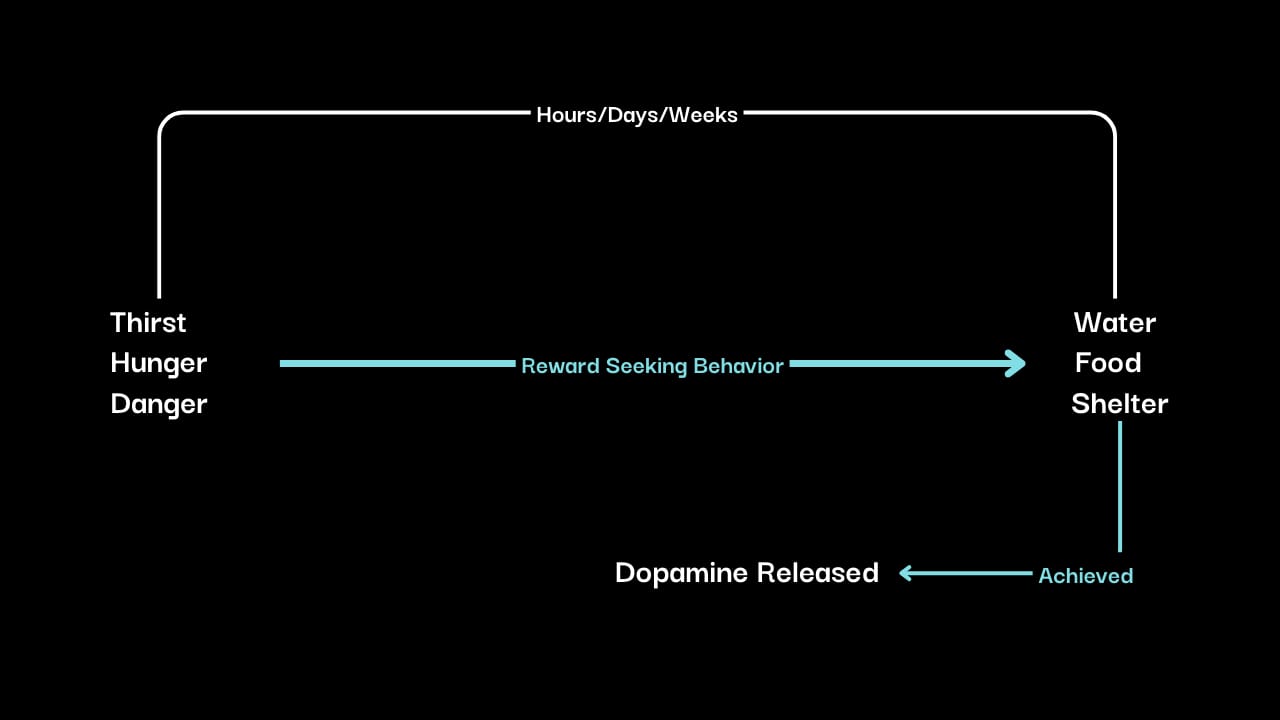- The Mast Letter
- Posts
- Dopamine Nation: The Story of Why You Don't Feel Motivated
Dopamine Nation: The Story of Why You Don't Feel Motivated
A conversation about modern society's unlimited reward system.
In 1992 the global rate of depression bottomed at 2.9%. In 2023 the global rate of depression has continued to rise to 3.9%.
During that same time levels of: poverty, health, literacy, and education have all increased dramatically.
So we have the highest quality of living for the most amount of people, yet we have highest rates of global depression—ever.
This seems counterintuitive.
While the explanations can be varied, they all seem to point to a common factor: dopamine— which is a central neurotransmitter involved in depression— has never been easier to acquire and abuse.
Dopamine Then and Now
While humans have progressed tremendously over the last 10,000+ years, our brains remained little changed in terms of biological evolution.
In other words, we still have our animalistic wiring despite no longer living in the wild, as animals.
Animalistic Dopamine

In survival, our brains would experience periods of thirst, hunger, and danger, which were followed by behavior to satisfy these needs.
The achievement of these needs resulted in dopamine being released in the brain, in order to encourage this behavior again in the future.
Previously this would have taken hours, days, and sometimes even weeks.
But in today’s world, a significant chunk of the population no longer encounters thirst, hunger and danger in the same way.
Modern Dopamine

In modern society we have a different set of periods: boredom, loneliness, and stress, which we satisfy with streaming, social media, binge eating etc.
Currently this process can be completed in a matter of minutes or seconds. Near instantaneous dopamine hits.
Same neurological process, significantly different circumstances.
Dopamine and Depression
A primary driver of depression is a lack of motivation to seek the things that make us happy and fulfilled.
We no longer seek social interaction, working out, professional development etc.
This lack fulfilling activities perpetuates the cycle of negative emotions, and eventually increases the symptoms of depression.
So how is dopamine involved?
Dopamine is commonly referred to as the “reward” chemical in the brain, but Dr. Andrew Huberman says it’s more accurate to refer to it as a the “motivation” chemical.
Simply put— when dopamine is low, motivation is low.
The Key Difference
The fact that our circumstances have changed isn’t inherently bad, but high global depression rates cue that something is off.
The role of dopamine is clear, it motivates us to seek behavior our brain deems as beneficial.
But there are different sources of dopamine.
This is the key distinction.
Dopamine Arcs

There are cheap sources of dopamine (streaming, social media, sugar) and expensive sources of dopamine (working out, getting a promotion)
They create a similar effect in the brain, but the way they get there is different.
An expensive source requires a higher amount of energy and time to reach peak dopamine.
For a workout it could take an hour, for a promotion it could take years.
This creates a steady rise in dopamine levels and gradual declines.
Streaming a video, scrolling social media and eating sugar can happen in minutes, with low energy required.
The brain can’t distinguish between good and bad dopamine sources, it just knows it received dopamine and it likes that.
You’re brain will always prefer what’s easier, until you train it to seek what’s more worth it.
Struggling with Motivation
If we are struggling with motivation, it’s worth taking inventory of how we are spending our time.
Chances are we are spending a significant portion of our time on cheap dopamine rather than expensive.
I take the following steps to reverse this trend:
Write down the cheap sources you spend the most time on
Start cutting one out daily
Replace that one with something slightly more expensive
think replace social media scrolling with reading
We don’t want the replacement activity to be too difficult at first, because that can prevent us from fully adapting to the change.
Join the Chat!
PS we started getting active in the chat feature on Substack. Click the button below to download the app and get started!
Reply